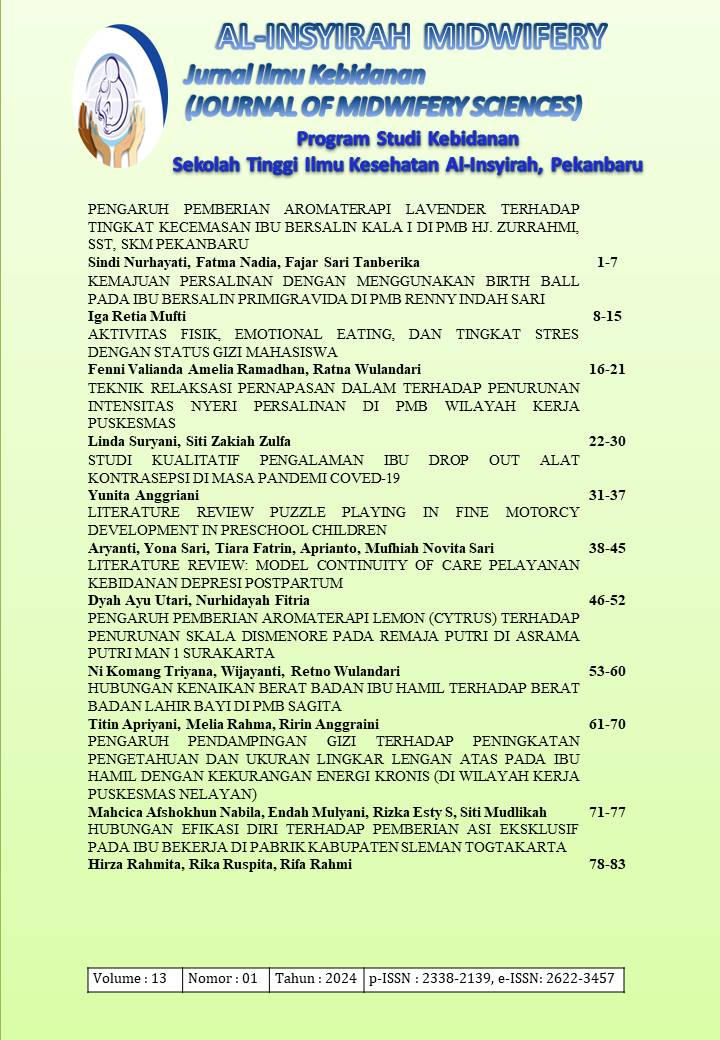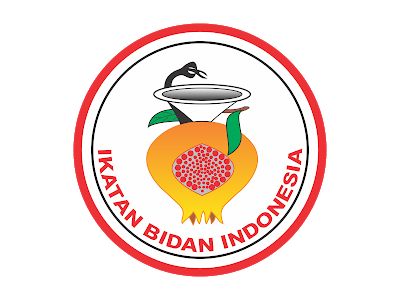HUBUNGAN EFIKASI DIRI TERHADAP PEMBERIAN ASI EKSKLUSIF PADA IBU BEKERJA DI PABRIK KABUPATEN SLEMAN YOGYAKARTA
DOI:
https://doi.org/10.35328/kebidanan.v13i1.2629Keywords:
Exclusive breastfeeding, Self-Efficacy, Working MotherAbstract
Exclusive breastfeeding can reduce infant morbidity and mortality, reduce the risk of chronic disease, and help the baby's development. Returning to work is one of the most common reasons mothers stop breastfeeding. Globally, there are around 51% of women involved in the workforce, compared to men, which is around 82%. One of the obstacles to providing exclusive breastfeeding to working mothers is their confidence in providing breast milk. This study aims to determine the relationship between self-efficacy and exclusive breastfeeding in mothers who work in factories in the Sleman Regency area. This research method is a quantitative analytical survey with a cross sectional approach. Sampling used a purposive sampling technique and obtained 75 samples of factory worker mothers who had babies aged 6-12 months. The research instrument used the Breastfeeding Self-Efficacy Scale questionnaire by Dennis (2003). The data analysis method used is univariate analysis, bivariate analysis with the Chi Square Test. The results of bivariate analysis showed that self-efficacy had a p value of 0.002 (OR 5.225 CI 1.871-14.593). Self-efficacy is related to exclusive breastfeeding for mothers who work in factories. Self-efficacy can be increased with understanding and support from the mother's environment.
Downloads
References
Anstey, E. H., Coulter, Martha., Jevitt, Cecilia M., Perrin, Kay M., Dabrow, Sharon., Lynne B. Klasko-Foster., et al. (2018) ‘Lactation consultants’ perceived barriers to providing professional breastfeeding support’, J Hum Lact, 34(1), 51–67. doi: 10.1177/0890334417726305.
BPS (2016). Jumlah Penduduk yang Bekerja Menurut Sektor dan Jenis Kelamin per Kecamatan di Kabupaten Sleman Tahun 2016.
______(2019) Booklet Survei Angkatan Kerja Nasional Agustus 2019, BPS.
Cook, Erica Jane., Powell, Faye., Ali, Nasreen Ali., Jones, Catrin Penn., Ochieng, Bertha., Randawa, Gurch. (2021) ‘Improving support for breastfeeding mothers: a qualitative study on the experiences of breastfeeding among mothers who reside in a deprived and culturally diverse community’, Int J Equity Health. International Journal for Equity in Health, 20(1), 1–14. doi: 10.1186/s12939-021-01419-0.
Dennis, C. (2003) ‘The Breastfeeding Self-Efficacy Scale : Psychometric Assessment of the Short Form’. doi: 10.1177/0884217503258459.
Gebremariam, Kahsu. T. T., Zelenko, O., Hadush, Z., Mulugeta, A., Gallegos, D (2020) ‘Exploring the challenges and opportunities towards optimal breastfeeding in Ethiopia: A formative qualitative study’, International Breastfeeding Journal. 15(1), 1–10. doi: 10.1186/s13006-020-00265-0.
Gharaei, T., Amiri-Farahani, L., Haghani S., & Hasanpoor-Azghady, S. B. (2020). The effect of breastfeeding education with grandmothers’ attendance on breastfeeding self-efficacy and infant feeding pattern in Iranian primiparous women: a quasi-experimental pilot study. International breastfeeding journal, 15(1), 1-10.
Henshaw, E. J. Fried., Fried., Siskind., Newhouse.,Cooper (2015) ‘Breastfeeding self-efficacy, mood, and breastfeeding outcomes among primiparous women’, J Hum Lact, 31(3), 511–18. doi:
Jara-Palacios, M. Á., Cornejo, A. C., Peláez, G. A., Verdesoto, J., & Galvis, A. A. (2015). Prevalence and determinants of exclusive breastfeeding among adolescent mothers from Quito, Ecuador: a cross-sectional study. International Breastfeeding Journal, 10(1), 1-8. Kemenpppa (2018) Profil Perempuan Indonesia.
Mudaharimbi, E. P. (2021). Efikasi Diri Ibu Primigravida yang Bekerja dalam Keberhasilan Memberikan ASI. Jurnal Promkes: The Indonesian Journal of Health Promotion and Health Education, 9(1), 28-35.
Nursan, C., Dilek, K. and Sevin, A. (2014) ‘Breastfeeding self efficacy and affecting factors’, Aquichan, 14(3), 327–35. doi: 10.5294/aqui.2014.14.3.5.10.1177/0890334415579654.
Pounds, L., Fisher, C.M., Josiah, D. B., Coleman, J. D., Lefebvre., R. C. (2017) ‘The Role of Early Maternal Support in Balancing Full-Time Work and Infant Exclusive Breastfeeding: A Qualitative Study’, Breastfeed Med, 12(1), 33–38. doi: 10.1089/bfm.2016.0151.
Rashid, A. A., Shamsuddin, N. H., Malek Ridhuan, R. D. A. R., Sallahuddin, N. A., & Devaraj, N. K. (2018). Breastfeeding Practice, Support, and Self-Efficacy Among working Mothers in a Rural Health Clinic in Selangor. Malaysian Journal of Medicine & Health Sciences, 14(2).
Sun, K. Chen, M., Yin, Y., Wu, L., Gao, L. (2017) ‘Why Chinese mothers stop breastfeeding: Mothers’ self-reported reasons for stopping during the first six months’, J Child Health Care, 21(3), 353–63. doi: 10.1177/1367493517719160.
Sulaiman, Z., Liamputtong, P. and Amir, L. H. (2016) ‘The enablers and barriers to continue breast milk feeding in women returning to work’, J Adv Nurs, 72(4), 825–35. doi: 10.1111/jan.12884.
Thussanasupap, B., Lapvongwatana, P., Kalampakorn, S., & Spatz, D. L. (2016). Effects of the community-based breastfeeding promotion program for working mothers: A quasi-experimental tudy. Pacific Rim International Journal of Nursing Research, 20(3), 196-209.
Wahyuni, S. D., Santoso, B., Triharini, M., & Susan, N. (2020). Perceptions of Working Mothers Toward Breastfeeding Self-Efficacy. Jurnal Ners, 15(2)
World Health Organization (2016) ‘BREASTFEEDING COUNSELLING A TRAINING COURSE PARTICIPANTS ’ MANUAL PART ONE Sessions 1-9’, Training Manual, 1–171. Available at: https://www.who.int/maternal_child_adolescent/documents/pdfs/bc_participants_manual.pdf.
Zhu, J., Chan., Wai C.S., Zhou, X.,Ye, Benlan., He, Hong Gu (2014) ‘Predictors of breast feeding self-efficacy among Chinese mothers: A cross-sectional questionnaire survey’, Midwifery. Elsevier, 30(6), 705–11. doi: 10.1016/j.midw.2013.12.008.
Zilanawala, A. (2017) ‘Maternal Nonstandard Work Schedules and Breastfeeding Behaviors’, Matern Child Health J. Springer US, 21(6), 1308–17. doi: 10.1007/s10995-016-2233-4.
Downloads
Published
Issue
Section
License
Copyright (c) 2024 Al-Insyirah Midwifery: Jurnal Ilmu Kebidanan (Journal of Midwifery Sciences)

This work is licensed under a Creative Commons Attribution 4.0 International License.














